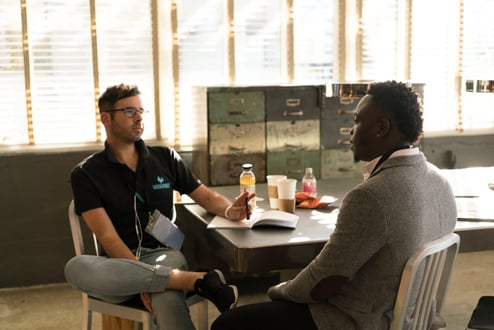In this new release we’ve had the pleasure to talk with Thomas Zoëga Ramsøy, who is considered one of the leading scholars and practitioners in consumer neuroscience and neuromarketing.
Thomas, trained in economics and neuropsychology, and with a PhD in neurobiology, is the founder and CEO of Neurons Inc and an Adjunct Faculty Member at Singularity University.
Let’s get started… Thomas, what did you want to be when you were growing up?
I was always interested in science, and in every thinkable way a nerd. I did anything from astronomy to cell biology, and anything in between. It’s an interest for things “out there and in here” that has always fascinated me. Indeed, I think I get a true kick out of science, and whenever something new is discovered.
So in a way I always knew I was going into science, although I did spend a decent amount of time with music and arts. At one time I was offered to go with a band on tour in France and play all the old jazz clubs. Also, before going into psychology, I was very close to skipping all that and go for a professional career as a fly fisher guide in Norway. I still wonder whether I’ve chosen the right thing…
When did you start your professional career in Neuromarketing and Neuroscience? And how was the beginning like?
The start was nothing like a planned and decisive move. I have studied economics and neuropsychology, and then worked within both areas before doing my PhD in neurobiology on MRI and other modalities such as EEG. But I have always been curious to make the next step and to look at things in a different way. So I started to study decision making and the brain, with a keen focus at “realistic” behaviours, not only lab behaviours.
So it was a natural gravitation towards economic behaviours, and we have run several studies on anything from the brain responses to the prisoner’s dilemma, to pathological gambling and consumer choice. I was invited by CBS Professor Flemming Hansen to build a collaboration between brain science and economics. What started as some interesting discussion ended up being my Center for Decision Neuroscience, which now holds a number of scholars and students.
In parallel, I have been consulting companies on how to employ the tools and insights from neuroscience in their business. I have to admit that I have had a lot of skepticism towards neuromarketing since it’s birth, and for a good reason: the field has been going through a couple of hype-cycles with over-claims and under-delivery. So I was not originally attracted to the field itself. Nevertheless, I have found myself in this area since my interest and curiosity has pulled me in, so to speak. But I’m still the skeptic amidst the yay-sayers.
This all eventually culminated a few years ago when I was contacted by Kyle Nel at Lowe’s Home Improvement, who actually shared my skepticism, yet realized that he needed neuroscience to avoid the horrors of traditional market research… We started to jam about what neuroscience solutions could really be reliably used in ad testing, store environments and so on. Today, the whole idea of helping companies build an internal language, employ neuroscience tools and to use those insights is the bearing principle of my company, Neurons Inc. And today we are doing crazy things: building a neuroscience lab at the NASA Ames Research Park, building what’s to become the world’s largest neuromarketing lab for a client, and testing in the most challenging conditions, including consumer responses to robots and augmented reality.
Who was/is your hero in the marketing world?
Coming from outside marketing, I cannot say that I have had any heros in the marketing world. Nor do I have anyone today. But I will say that I am eternally indebted to two people: Lenny Murphy for building GreenBook and the awesome IIEX and NIMF events, and to Carla Nagel who has spent already far too much incredible time on building NMSBA.
Besides this, my own scholarly inspiration goes back to Pat Churchland and Dan Dennett, who have been changing the way we should think about the brain and the mind.
 If you had to name one attribute every neuromarketer should have, which would it be?
If you had to name one attribute every neuromarketer should have, which would it be?
That’s REALLY tough. I would love to say “a scientific mind”, since it would go to the point of an open and honest approach to using neuroscience methods. But a major chunk of this business is to also be able to explain the tools and insights to clients. What good is a great science if it doesn’t provide actionable insights? So I am torn between “a scientific mind” and “explanatory abilities”.
How do you get inspired to create? What field, besides yours, inspires you the most?
Breaks are the best ways to get creative. Spending time with my beloved wife and three kids takes the stress out of things, no doubt. We intentionally live a good deal outside a major city, since we find that it is much better to live closer to nature. It gets your shoulders down, mind wanders, and your endorphins are doing their job. As everybody knows, the best ideas come when you are doing “something else”. So I try to combine an intense work life with absolute spare time. It’s challenging but definitely the best way.
What would you say is the most interesting research project you have carried out?
Tough question. These days I am waking up every morning and pinch myself. We are testing human responses to robots, how people respond to augmented and virtual reality, and workforce attractions such as Dubai vs. other expat communities. There simply does not seem to be an end to these interesting projects. But one thing that has really blown me away is when I got results from a recent YouTube study we did using my automated image/video analysis tool, NeuroVision, and were able to predict YouTube hits with a high accuracy. That must be one of the coolest things.
How would you describe the current situation of the industry?
I think it’s shaping up! We are definitely doing much better than ever before. We are getting away from the worst hype cycles, we have organized bodies where we can meet and evolve, more schools are teaching classes and courses on the topic, and I find that the scientific community have caught on with studying the brain bases of consumer behaviours, too.
What do you think Neuromarketing will be like in 10 years’ time? What challenges do you think will be needed to face?
I can’t even predict how it will look in 2 years! My guess is that the technologies we are currently using will become more reliable, smaller, cheaper and better at being integrated. We already see that biometrics and other tools are coming online and in stores, and although many solutions are still suffering from bugs and suboptimal performance, it’s just a matter of time before we see applied neuroscience methods being better integrated with things like big data and gamifications.
Which film or book do you recommend to anyone who wants to become a neuromarketer?
I would like to think that my own book – Introduction to Neuromarketing & Consumer Neuroscience – is a suitable start. Besides this I think that Neuromarketing for Dummies is about the best book I have had on this. I also very much enjoy “Seducing the subconscious” by Robert Heath – he’s definitely on to something.
And at last, your life motto in 1 tweet
“Don’t have a life motto! :D”






